Can bearded dragons eat watermelon? Everyone likes watermelon because it is a sweet, hydrating and a summer favorite. And your pet bearded dragon likes watermelon the way you like it. But before you share a piece with your scaly friend, it’s crucial to understand the guidelines for their consumption.
Watermelon, primarily composed of water, holds a neutral stance in terms of suitability for bearded dragons. However, excessive consumption may lead to adverse effects, as watermelon lacks significant nutritional density. While watermelon can be included in their diet occasionally, it is essential to view it as a treat rather than a staple food for bearded dragons.
Captive-Bred vs. Wild Bearded Dragons
Over the past few years, bearded dragons have witnessed a surge in popularity, particularly the inland bearded dragon, touted as one of the best lizard pets. Renowned for their captivating nature, resilience, and docility, these creatures make excellent pets despite their exotic appeal.
Bearded dragons, readily available in pet stores and reptile expos, are commonly chosen as pets. However, despite their accessibility, these animals are considered exotic and demand specialized care, including a tailored diet.
| Pros and Cons of Watermelon |
|---|
| Positive Aspects |
| Low oxalates |
| Minimal goitrogens |
| Potential appetite stimulant |
| Concerns |
| Sugar content |
| Lack of nutritional density |
| Imbalanced calcium-to-phosphorus ratio |
Bearded dragons exhibit an omnivorous nature, consuming a blend of insects and vegetables. Tailoring the diet to the dragon’s age is crucial. Younger dragons thrive on a diet comprising 80% insects and 20% plants, while adults benefit from a reversal, with a higher proportion of vegetables to insects.
Safe and Nutritious Vegetables
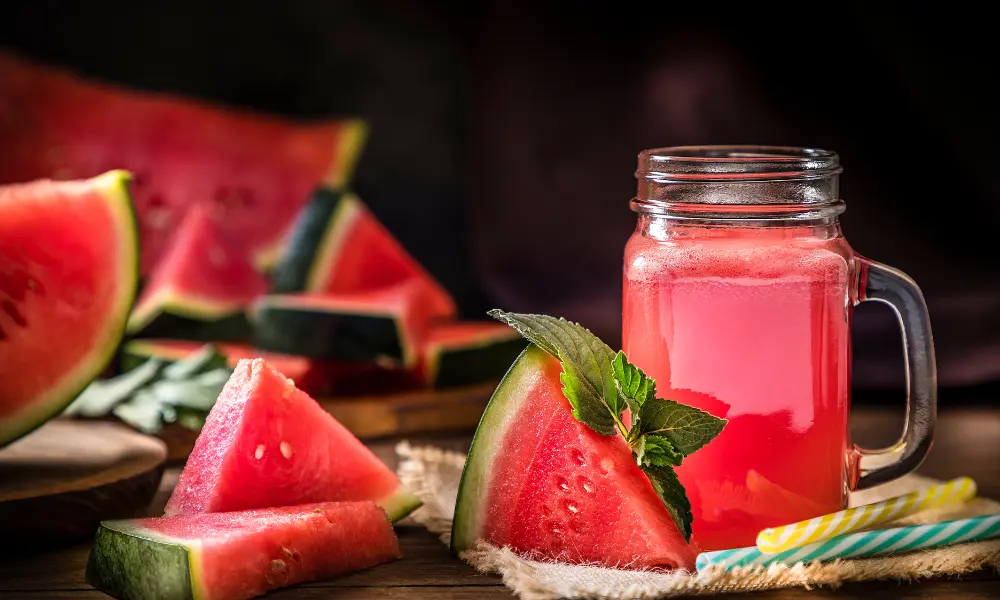
When it comes to vegetables, a variety is key. Safe options include bell peppers, cabbage, carrots, celery, kale, and asparagus. Avoiding vegetables like spinach, broccoli, and romaine is imperative due to potential harm or limited nutritional value. Fruits such as apples, strawberries, watermelon, and peaches can also be included.
Bearded dragons exhibit a broad appetite for insects. While crickets and dubia roaches are popular choices, it’s essential to ensure the insects are safe and free from parasites or pesticides. Dubia roaches, in particular, are favored for their lower parasite risk and higher protein content compared to crickets.
To prevent metabolic bone disease, a fatal condition affecting bearded dragons, it’s crucial to supplement their diet with calcium and vitamin D3. These supplements can be sprinkled on vegetables or insects.
For new owners, seeking guidance from local pet stores or captive breeders is paramount. Despite their exotic charm, bearded dragons make fantastic pets for all ages. By following the advice provided in this article, you can ensure your dragon receives the quality care and diet it deserves.
So, Can Bearded Dragons Eat Watermelon?
Bearded dragons can enjoy watermelon occasionally, but it’s crucial to understand its nutritional profile. Watermelon is low in nutrients compared to other fruits, making it less beneficial for dragons.
Feeding Frequency
Due to its high water content (92%), bearded dragons can consume small pieces of watermelon once a month or less. While it provides essential vitamins and minerals, moderation is key.
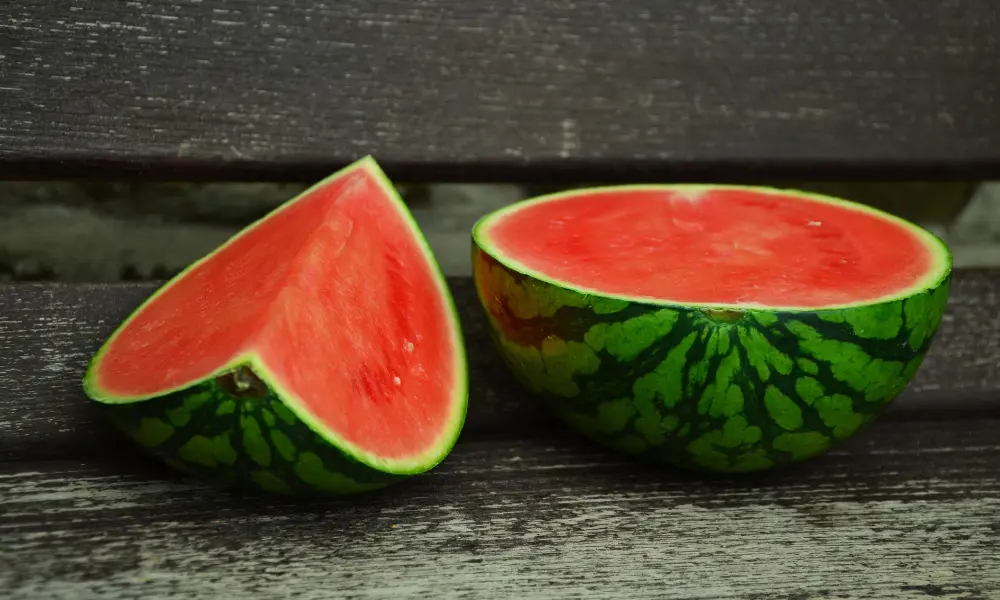
Key Nutrients in Watermelon
When dragons eat watermelon in moderation, they benefit from Vitamin C, beta carotene, magnesium, and potassium, contributing to immune system strength, vision, metabolism, and blood pressure regulation.
| Benefits of Watermelon | Information |
|---|---|
| Explore the positive aspects of incorporating | Discover the hydration benefits and essential nutritional information of watermelon for your bearded dragon. |
| watermelon into your bearded dragon’s diet. | |
| Key Nutritional Information (per 100g): | |
| – Water content: 91.4g | Watermelon is a hydrating option, with a high water content of 91.4g per 100g, ideal for maintaining your bearded dragon’s hydration. |
| – Carbohydrates: 7.55g | It provides a moderate carbohydrate source, offering 7.55g per 100g, contributing to your pet’s energy needs. |
| – Fat: 0.15g | With a low-fat content of 0.15g per 100g, watermelon serves as a lean option for your bearded dragon’s diet. |
| – Protein: 0.61g | While not a significant protein source, watermelon contributes 0.61g per 100g, adding a small protein component to their diet. |
| – Fiber: 0.4g | The fiber content of 0.4g per 100g supports digestive health and may aid in maintaining regular bowel movements. |
| – Calcium: 7mg | Although not a major calcium source, watermelon provides 7mg per 100g, contributing to overall mineral intake. |
| – Phosphorus: 11mg | It contains 11mg of phosphorus per 100g, contributing to the balance of minerals in your bearded dragon’s diet. |
| – Beta-carotene: 303 micrograms | The presence of 303 micrograms of beta-carotene per 100g offers an antioxidant boost, potentially promoting immune system health in your pet. |
Why Can’t Bearded Dragons Have Watermelon Every Day?
Frequent consumption of sugary fruits, including watermelon, can lead to obesity, liver problems, diabetes, and dental issues. It’s essential to prioritize a balanced diet for your dragon.
While it’s true that bearded dragons can consume watermelon, it should be regarded as an occasional treat rather than a regular part of their diet. There are several compelling reasons to exercise caution and limit their intake of this refreshing fruit.
Firstly, watermelon lacks the nutritional density necessary to significantly contribute to your lizard’s overall health. Numerous other fruits offer superior nutritional benefits, making watermelon a suboptimal choice to meet the dietary requirements of your pet bearded dragon.
An additional concern is the high sugar content in watermelon. Despite being a tempting and sweet option for bearded dragons, excessive consumption can contribute to weight gain, a common issue in captive beardies. Elevated sugar levels can also lead to more severe health problems, including diabetes, tooth decay, and liver issues, as the lizard’s physiology struggles to process an excess of sugar.
Lastly, the substantial moisture content in watermelon, comprising around 92 percent water, has both benefits and drawbacks. While it can offer a hydration boost to your bearded dragon, excessive consumption may lead to stomach upsets. The surplus water can cause diarrhea, further contributing to dehydration. While small amounts may not pose a significant issue, allowing your bearded dragon unrestricted access to watermelon can lead to digestive problems.
Calcium Depletion
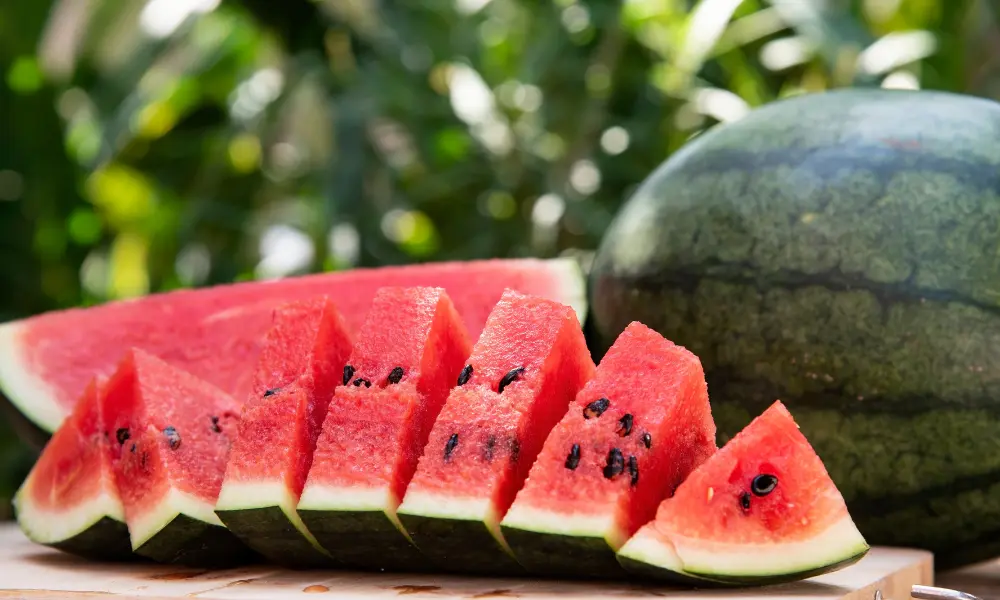
Watermelon contains more phosphorus than calcium, posing a risk of calcium depletion. Prolonged imbalance may lead to metabolic bone disease (MBD), causing skeletal deterioration, weakness, and paralysis.
The calcium and phosphorus content in watermelon present another set of challenges. With approximately 16.9 milligrams of phosphorus and 10.8 milligrams of calcium per cup, the imbalance favors phosphorus. This poses a significant problem, as phosphorus hinders the optimal absorption of calcium in your beardie’s body, potentially resulting in critical health issues such as bone disorders and fractures.
Expert Tip: Adequate calcium intake is crucial for the well-being of bearded dragons, as a deficiency can lead to severe complications. Overindulging in watermelon exacerbates the risk of bone deterioration.
Digestive Issues
Excessive water content in watermelon can cause diarrhea and subsequent dehydration in bearded dragons. Careful moderation is necessary to avoid digestive complications.
How Can Bearded Dragons Eat Watermelon?
Both seeded and seedless watermelons are suitable, but all seeds must be removed. Choking or gut impaction can occur if dragons ingest seeds. Opt for soft, dark pink flesh, and avoid feeding any part of the rind.
Feeding Technique
Slice the seedless watermelon into small pieces after seed removal. Offer them alone or with vegetables in your dragon’s food bowl. Use the sweetness of watermelon to encourage vegetable consumption but exercise caution to prevent preference for sweets over essential vegetables.
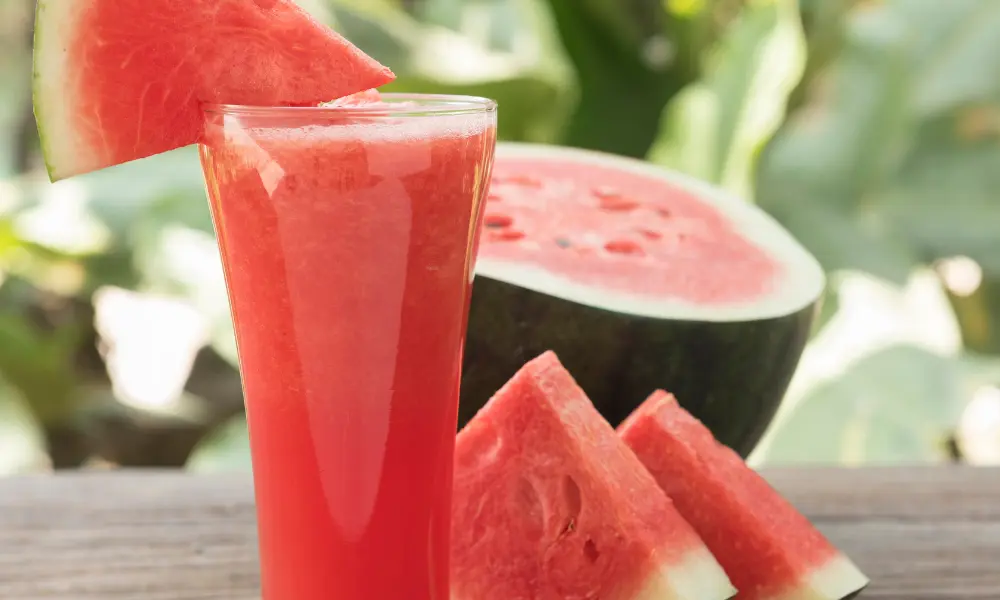
Other Fruits for Bearded Dragons
For more frequent treats, consider incorporating these fruits into your dragon’s diet once a week:
| Alternatives and Variety | Information |
|---|---|
| Figs | Rich in fiber, vitamins, and minerals, figs are a delicious and nutritious option for your bearded dragon. |
| Mangoes | Packed with vitamins A and C, mangoes provide a sweet and juicy alternative to watermelon, promoting overall health. |
| Papaya | A tropical fruit high in antioxidants and enzymes, papaya supports digestion and adds variety to your bearded dragon’s diet. |
| Apples | Low in fat and high in fiber, apples are a crunchy and hydrating option, offering essential nutrients in a different form. |
| Cantaloupe melon | With high water content, this melon provides hydration and a range of vitamins, contributing to the overall well-being of your pet. |
| Strawberries | Rich in antioxidants, strawberries are a tasty treat that adds a burst of flavor while delivering essential nutrients. |
| Dates | A natural source of energy, dates offer a sweet and nutritious option for occasional indulgence in your bearded dragon’s diet. |
| Cabbage | High in fiber and low in calories, cabbage is a cruciferous vegetable that provides a different texture and nutritional profile for your pet. |
| Lettuce | Offering hydration and some vitamins, lettuce can be a refreshing addition to your bearded dragon’s diet when provided in moderation. |
| Cauliflower | A cruciferous vegetable with a mild taste, cauliflower is a source of vitamins and minerals, contributing to a diverse and balanced diet. |
| Collard greens | Nutrient-rich and low in oxalates, collard greens are a leafy green option that supports overall health without compromising on calcium balance. |
| Parsley | A herb with potential health benefits, parsley adds flavor and small amounts of vitamins to your bearded dragon’s diet when used as an occasional treat. |
| Turnip greens | Another leafy green choice, turnip greens offer vitamins and minerals while being low in oxalates, making them a suitable option for your pet. |
| Bell peppers | Colorful and rich in vitamin C, bell peppers provide variety and essential nutrients to enhance your bearded dragon’s diet. |
| Kale | A nutrient-dense leafy green, kale offers vitamins and minerals while being low in oxalates, making it a valuable addition to your pet’s diet. |
| Green beans | Low in calories and high in fiber, green beans are a crunchy and nutritious vegetable that can be included as part of a well-balanced diet for your bearded dragon. |
While fruits like watermelon can be a delightful addition to your bearded dragon’s diet, moderation is paramount. Prioritize a well-balanced diet to ensure your dragon’s overall health and longevity.
Should Bearded Dragons Eat Watermelon Seeds?
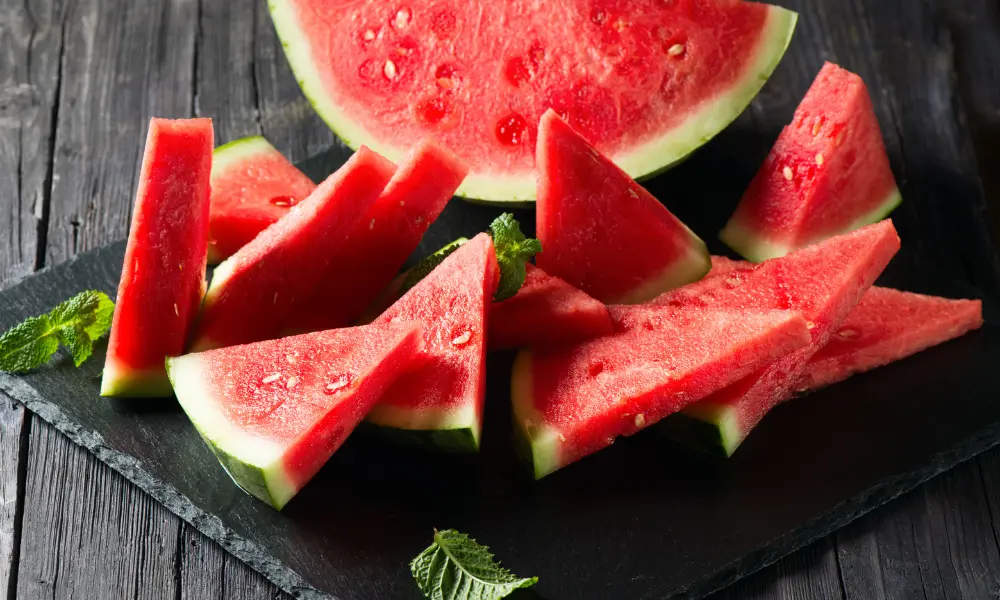
No, it is strongly advised against feeding bearded dragons watermelon seeds.
Always opt for seedless portions. Whether your watermelon is seedless or not, thoroughly examine the pieces and eliminate any hard seeds.
Seeds pose various issues. A voracious lizard may easily choke on larger seeds, and even if swallowed, the pointed side could potentially cause throat abrasions during ingestion.
Additionally, watermelon seeds can create complications in the digestive system. They have the potential to obstruct the digestive tract, hindering the passage of stool. This poses a significant health risk that demands immediate attention.
To mitigate all these risks, ensure the removal of every seed before offering the watermelon to your bearded dragon.
Final Verdict | Can Bearded Dragons Eat Watermelon?
It is advisable to assess the nutritional content of foods before feeding them to pets. Here is the detailed breakdown of 100g of watermelon based on the US Department of Agriculture:
- Fiber: 0.4g
- Lipids: 0.15g
- Water: 91.45g
- Protein: 0.61g
- Energy: 30 Kcal
Watermelon also contains trace amounts of iron, zinc, copper, sodium, calcium, potassium, phosphorus, and magnesium. Feeding small watermelon pieces once a month poses no issues, but it’s crucial to avoid making it a regular part of their diet. Overindulgence may result in your bearded dragon neglecting other nutrient-dense foods.
While watermelon contributes to hydration and offers a flavorful experience, moderation is key to prevent potential health risks. A few small pieces of watermelon per month are acceptable. Using an electric food processor can assist in preparing appropriately sized pieces.
Ensure proper preparation by removing all seeds, offering only the pink flesh, and choosing ripe watermelons. Start with a smaller portion for the first time and monitor for adverse reactions. The green part (rind) is challenging to chew and can lead to digestive issues. Always remove the rind before feeding.
Watermelon seeds are a choking hazard and should be removed entirely. Even seedless watermelons should be checked for any seeds. The white part near the rind is hard to chew and may cause digestive damage. Exclude it from your bearded dragon’s diet.
Benefits:
- Hydration
- Enjoyable treat
- Provides essential vitamins and minerals
- Hyperglycemia (due to high sugar content)
- Hypocalcemia (interfering with calcium absorption)
- Diarrhea
- Chronic Protein Disease (imbalanced diet leading to health issues)
Include a variety of fruits in moderation, avoiding toxic options like avocado and rhubarb. Bearded dragons transition from a higher insect intake to a more plant-based diet as they age. Ensure a balanced distribution of staple greens, fruits, and occasional treats.
- Water for hydration
- Protein for growth
- Calcium for bone health
- Fruits and vegetables for vitamins and minerals
Optimal temperature, lighting, and plant choices impact a bearded dragon’s food utilization and digestion efficiency. Maintain temperatures within recommended ranges for efficient digestion. Ensure 12-14 hours of UVA and UVB light daily for vitamin D3 production.
Be cautious with artificial plants, as bearded dragons may ingest them. While watermelon can be a delightful treat for bearded dragons, a balanced diet and environmental considerations are crucial for their overall health. Consult your vet for personalized nutritional advice, and always be mindful of moderation in feeding practices.




